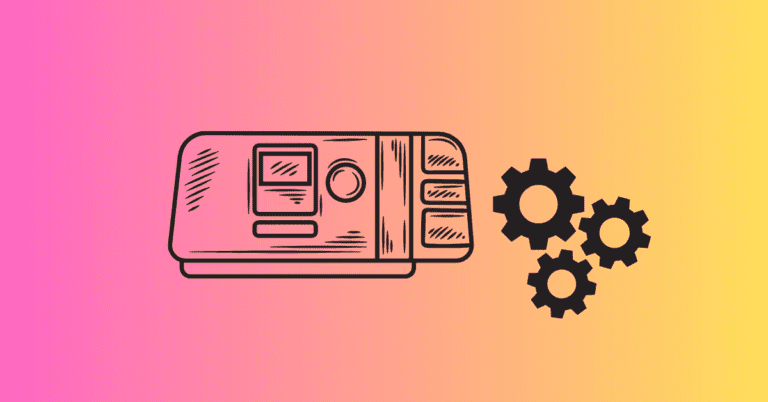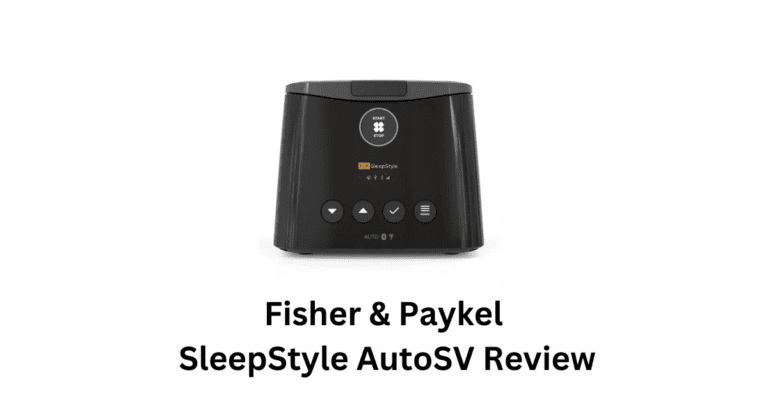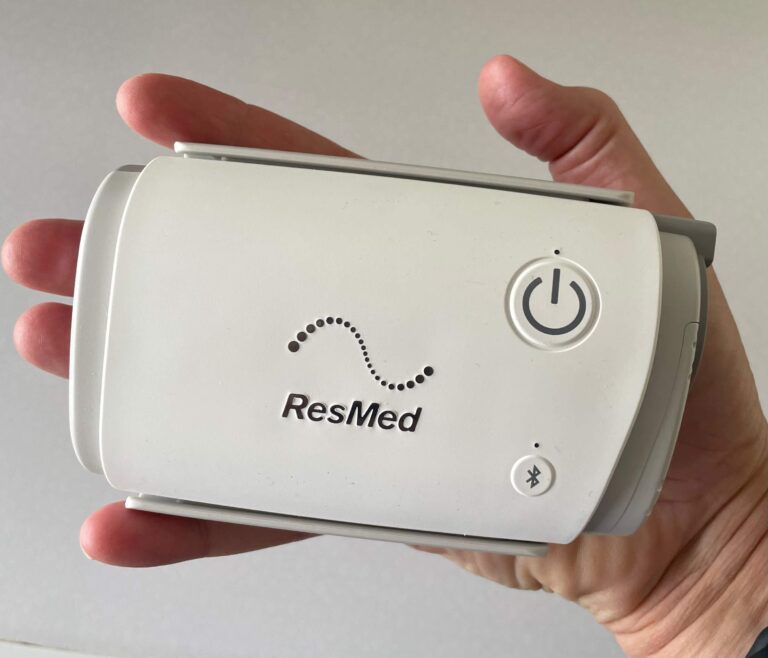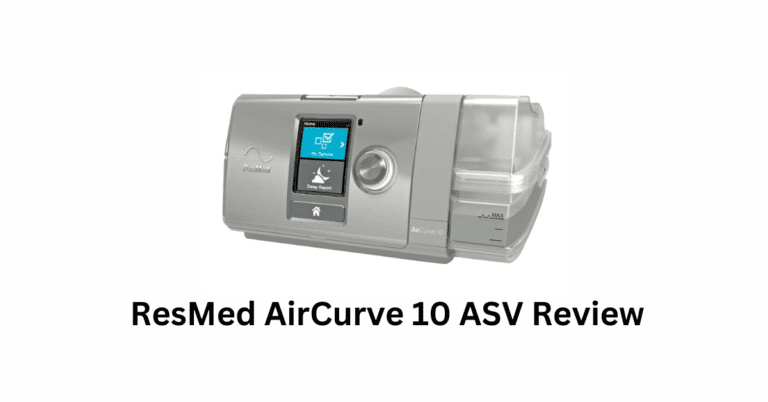ASV Machines: All you Need to Know
Jeremy Smith is a long-term CPAP user and sleep apnea advocate. After being diagnosed with severe obstructive sleep apnea, he created ByJeremySmith.com to help others navigate CPAP therapy through personal stories, gear reviews, and practical advice.
Why would you need an ASV machine?
Sleep apnea is a condition that causes repeated interruptions in breathing during sleep, leading to poor sleep quality and other health complications.
I should know. I have severe sleep apnea and use a Continuous Positive Airway Pressure (CPAP) machine.
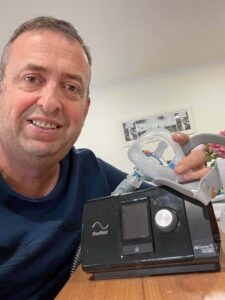
While CPAP machines are the most common treatment for obstructive sleep apnea, some patients with central sleep apnea or complex sleep apnea may benefit more from a more advanced device called an Adaptive Servo-Ventilation (ASV) machine.
In this article, I will explore ASV machines, how they work, and why they are a critical treatment option for certain types of sleep apnea.
Let’s jump right in.
What Is an ASV Machine?
An Adaptive Servo-Ventilation (ASV) machine is a specialized device for treating central sleep apnea (CSA) and complex sleep apnea.
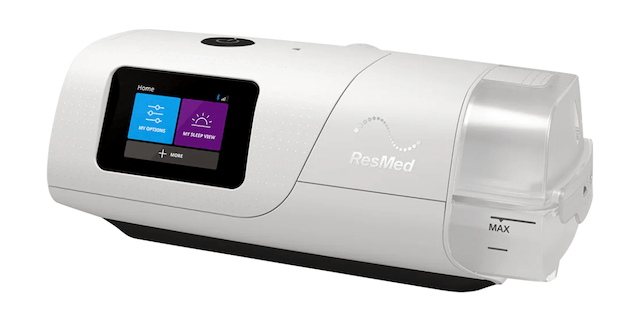
🎓 To learn more about this machine, follow this link for my full ResMed AirCurve™ 11 ASV review.
Unlike obstructive sleep apnea, which occurs when the airway is physically blocked, central sleep apnea occurs when the brain fails to send proper signals to the muscles that control breathing.
ASV machines are clever because they are designed to address this by monitoring the patient’s breathing and adjusting the air pressure in real time to support regular breathing patterns.
How Does an ASV Machine Work?
ASV machines use sophisticated algorithms to track a person’s breathing patterns throughout the night.
🎓 See my full article detailing how ASV machines work, or read my summary below.
They continuously monitor the patient’s airflow and respond by automatically adjusting the air pressure based on the person’s needs. Here’s how it works:
- Breath Monitoring: The machine tracks each patient’s breath, identifying any irregularities or pauses in breathing.
- Pressure Adjustments: When the machine detects that the patient isn’t breathing adequately (such as during a central apnea episode), it increases air pressure to stabilize breathing. When normal breathing resumes, the machine reduces the pressure to a comfortable level.
- Adaptive Response: Unlike traditional CPAP machines, which provide continuous air pressure, ASV machines can adjust pressure dynamically, depending on the patient’s immediate respiratory needs.
This dynamic approach makes ASV ideal for treating central and complex sleep apnea, where the brain’s control over breathing is inconsistent.
Who Should Use an ASV Machine?
ASV machines are typically prescribed to patients with central sleep apnea (CSA) or complex sleep apnea syndrome.
These patients experience abnormal breathing patterns due to their brains’ failure to regulate breathing properly during sleep. ASV therapy helps normalize breathing patterns by providing more responsive and targeted treatment than standard CPAP.
Conditions Treated by ASV:
- Central Sleep Apnea (CSA): This occurs when the brain does not send the correct signals to control breathing, leading to periodic pauses in breathing.
- Complex Sleep Apnea Syndrome: Also called mixed sleep apnea, this occurs when someone has both obstructive sleep apnea and central sleep apnea.
- Cheyne-Stokes Respiration: This is a specific breathing pattern characterized by fluctuating breaths, often seen in patients with heart failure.
While CPAP machines are generally recommended for obstructive sleep apnea, patients with central or complex sleep apnea tend to benefit more from ASV therapy, as it can better handle the variations in breathing patterns.
ASV vs. CPAP: What’s the Difference?
While both ASV and CPAP machines are used to treat sleep apnea, there are key differences between the two:
CPAP Machines:
- Constant Pressure: CPAP machines deliver a continuous stream of air at a fixed pressure to keep the airway open during sleep. This is effective for obstructive sleep apnea but not for central sleep apnea.
- Simpler Function: CPAP is designed to treat physical blockages in the airway, making it the standard treatment for obstructive sleep apnea but less effective for central apnea.
ASV Machines:
- Adaptive Pressure: ASV machines adjust the air pressure dynamically based on the patient’s real-time breathing patterns. This makes it more effective for treating central sleep apnea and complex sleep apnea, where physical blockages don’t cause breathing irregularities.
- Advanced Monitoring: ASV continuously monitors the patient’s breathing and automatically adapts to changes, offering more personalized treatment.
For patients with both obstructive and central sleep apnea, an ASV machine may be recommended when standard CPAP therapy does not address the full range of breathing issues.
Benefits of ASV Therapy
Patients who use ASV machines to treat central sleep apnea often experience several benefits compared to other treatment options. These benefits include:
1. Improved Sleep Quality
ASV therapy helps regulate breathing throughout the night, reducing the number of apnea episodes. This leads to more restful and uninterrupted sleep, helping patients feel more refreshed in the morning.
🎓 Click here to read my article about how ASV data tracking works.
2. Reduced Daytime Fatigue
Since sleep apnea often causes fragmented sleep, patients with untreated apnea can suffer from significant daytime fatigue. ASV therapy helps normalize breathing patterns, leading to more consistent sleep and less daytime drowsiness.
3. Better Management of Central Apneas
ASV machines are specifically designed to treat central sleep apnea, where the issue is neurological rather than physical. ASV’s ability to adjust air pressure in response to breathing irregularities makes it far more effective for patients with CSA than a standard CPAP machine.
4. Personalized Treatment
Unlike CPAP, which uses a fixed pressure setting, ASV dynamically adjusts the pressure, ensuring the patient receives the right amount of support at any given moment. This personalized approach makes ASV a more effective solution for patients with complex sleep disorders.
Potential Risks and Considerations
While ASV therapy is highly effective for many patients with central or complex sleep apnea, there are some potential risks and considerations:
- Heart Failure Concerns: ASV therapy is generally not recommended for patients with certain types of heart failure, particularly those with reduced ejection fraction. In such cases, alternative treatments for sleep apnea may be needed.
- Cost and Availability: ASV machines are more expensive than standard CPAP machines, and not all insurance plans may cover the device.
- Complex Setup: Because ASV machines are more advanced, they may require more adjustments and monitoring to ensure they are working effectively for the patient.
It’s essential to discuss any potential risks or concerns with your doctor before starting ASV therapy.
🥇 Check out the machines on the market and where to buy them in my comprehensive ASV machines review.
Conclusion: Is an ASV Machine Right for You?
An ASV machine is a highly effective treatment for people with central sleep apnea or complex sleep apnea syndrome. By dynamically adjusting air pressure based on your breathing patterns, ASV provides personalized support to help stabilize your breathing during sleep.
If you’ve been diagnosed with central sleep apnea or have mixed symptoms of both obstructive and central apnea, ASV therapy may offer the relief you’ve been seeking.
However, it’s essential to consult with your sleep specialist to determine whether ASV is the right choice for you, especially if you have underlying health conditions like heart failure.
🎓 Want to learn what the future holds for ASV? I’ve written this article about the future of ASV technology.
Do you have any questions about ASV machines and how they work? If so, ask away in the comments below.
Disclaimer: The content on this blog is for informational and educational purposes only and is not a substitute for professional medical advice. Always speak with your doctor or sleep specialist before starting, stopping, or changing any treatment or therapy related to sleep apnea or CPAP use.

